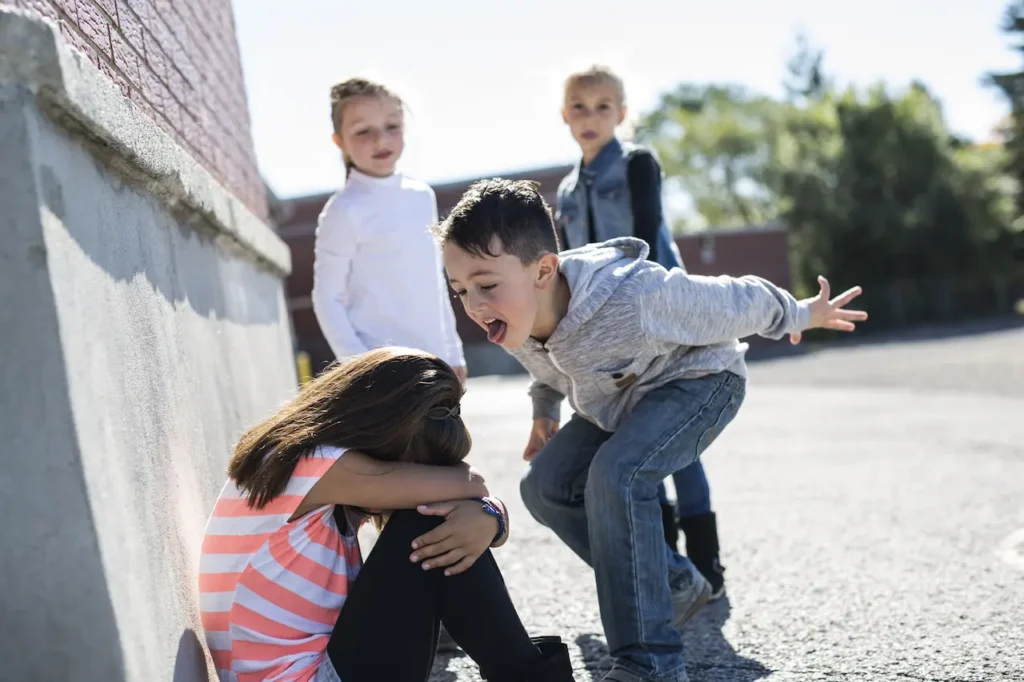What is Bullying?
- An Unbalanced Power: Children who bully abuse their power, such as their physical strength, the access they have to embarrassing information or their popularity, to control or harm other children. Even if the same person is involved, power imbalances can shift over time.
- Repeated Behaviours: Bullying behaviour can occur more than once or has the potential to repeat itself.

Bullying Can Occur Anywhere and at any Time.
Bullying can happen during or after the school day. Bullying can occur in or outside of the school. Bullying can occur on the way to or from school, in a youth’s neighbourhood, or via the Internet.
How Common is Bullying at School?
Bullying is harmful to both men and women. It can also be detrimental to the bully. According to PREVnet’s research, which is a Canadian authority in bullying prevention, 12 to 18 per cent of girls and boys reported bullying and being bullied. The school strategies must address both the victims and bullies, regardless of demographics. Find out more about the myths and facts of bullying.
Most successful strategies are those that focus on building self-esteem and developing respectful relationships, as well as communicating clearly but respectfully. Bullied children need to feel empowered and be supported in building healthy relationships. On the other hand, bullies need to be taught social responsibility, empathy and right from wrong, as well as remedial actions like rebuilding relationships and saying sorry. PREVnet is accumulating evidence that shows children who bully others risk having a life of difficulty with other people, and even being bullied.
What Types of Behaviour are Considered Bullying?
Bullying takes many forms.
- Verbal Bullying Examples include name-calling, making fun, making jokes about another person, unwelcome taunting, and spreading secrets that someone revealed in confidence.
- Physical Bullying: Pushing or shoving others, pinching them, hitting them, spitting on their faces, damaging property and vandalising school supplies.
- Bullying social Examples include spreading rumours and being exclusive to friends.
- Cyberbullying: Use of social media for intimidation, exclusion, and dissemination of private information using texts, emails, and other applications to harm someone’s reputation.
Bullying Warning Signs

Bullying Signs in Children
Be on the lookout for any changes in your child. Be aware, however, that not all bullied children will show warning signs.
There are several signs of bullying:
- Unexplainable injuries
- Clothing, books, electronic devices, and jewellery that have been lost or destroyed
- Feeling sick or feeling frequent headaches, or stomachaches
- Changes in eating patterns, such as suddenly skipping meals and binge eating. Children may be hungry after school because they skipped lunch.
- Sleep problems or nightmares
- Dropping grades, lack of interest or desire to attend school
- Sudden loss or avoidance of social situations
- Feelings of low self-esteem
- Self-destructive behaviour such as running from home, harming oneself, or discussing suicide
What Parents Can Do
You have a role to play as a parent or caregiver in helping your child stay healthy and safe. This includes their mental well-being. It is important to talk to your children about their relationships and friendships with other kids. This will help you identify if they are being bullied.
Discuss with your child about bullying or how to intervene if you see someone else being bullied.
Most children have their social media accounts and have a mobile phone or another electronic device that they can use to chat with friends online. You should have regular discussions with your child regarding privacy, password protection and image sharing.
Asking questions and listening to what your child says is the first thing you should do if you’re worried that your child may be being bullied. Encourage your child and ask them to describe what they’re experiencing.
Give your child some advice on how they can stop bullying.

Get Help from School
When children, parents, and schools work together to prevent bullying and tackle it, the best results are achieved. Start by talking to your classroom teacher, wellbeing coordinator, or assistant/deputy Principal.
Speak to the teacher of your child. Ask them if they’re aware of the bullies and how you can support your child.
Speak to the school to find out how you can best support your child in continuing to attend. Talk to the school about how you can help your child stay in school.
You should be able to access the bullying policy on every school’s website. The school’s bullying policy will outline how it prefers to handle bullying incidents, and may also provide you with advice about what the school can do to help your child and yourself. The school’s policy on bullying can give you an idea about how they will handle your child’s situation.
If your child has any difficulties at school, ask a teacher or school counsellor.
- Are you worried that your child is feeling angry, sad, or lonely?
- Do they feel stressed because of their schoolwork?
- Are you worried about your child’s struggles with school or their inability to make friends?
- Are there any previous taunts or group dynamics at play?
Do a family review and reflect on the situation at home
- Do they have a concern about something at home, such as a pet that has died or parents who are fighting or separating from each other?
- Does someone in your home (a parent or family member) bully your child?
- Do they have a jealousy of their brother, sister or other child?
- Can you set boundaries and maintain discipline?
- Are you a good parent? Do you take an active interest in the life of your child?
Bullying and the Law
Bullying that occurs on the phone or computer can be considered illegal in some situations. Parents who engage in bullying on the phone or computer can face legal action or lose their phone or Internet account.
Ask For Help
You should seek professional help if you’re worried about the situation or if your child isn’t thinking before they act.
It can take a long time for bullying to stop. Professional support can help.


